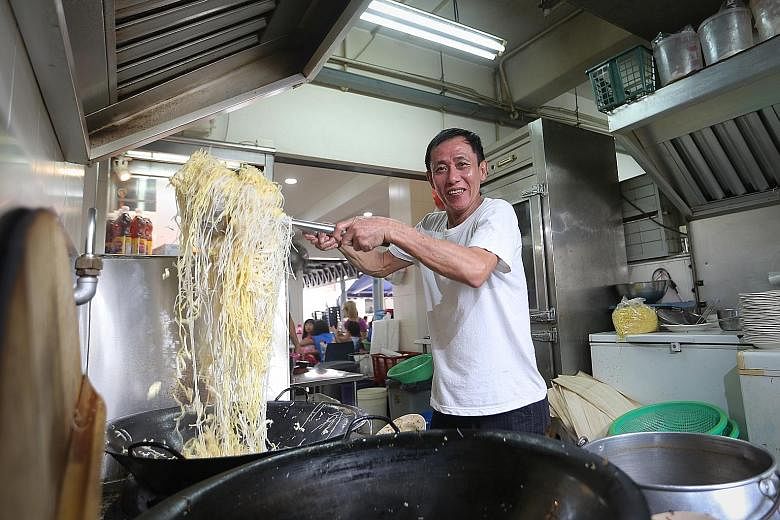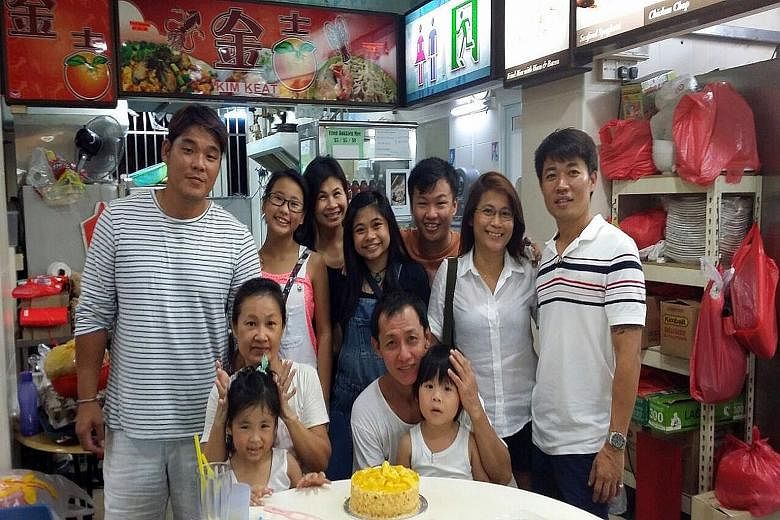The open flames surge bright and strong, goading the seasoned wok into a state of frenzied heat.
Into the mixture of lard, garlic and egg goes a mammoth heap of egg and rice noodles. Dexterously wielding a spatula in his right hand, and a ladle in his left, Lee Eng Keat expertly fries the noodles, often tossing them up in the air.
The task requires strong arms and even sturdier wrists, which the 55-year-old obviously possesses, despite his slight and skinny frame.
If you are lucky, the wait for a portion of Kim Keat Fried Hokkien Mee in Block 92, Toa Payoh Lorong 4 is 15 minutes. More often than not, it is half an hour, if not more.
Watching him at work, one would think that Mr Lee has been at his craft at least half his life.
He has not. He sold Hokkien mee for just a few years from the late 1980s and only opened his Toa Payoh stall last year.
The bulk of his life was spent on endeavours a lot more nefarious like drug dealing and pimping. He has been in and out of prison countless times, received 34 strokes of the rotan and spent nearly 20 years behind bars.
He turned over a new leaf several years ago while in the slammer for the sake of his grandchildren.
"I failed my mother, my wife and my children but I told myself that I would not fail my grandchildren. For their sake, I had to let go of my past and be a better person," says the divorcee, who has one son, two stepdaughters and five grandchildren. His children are aged between 35 and 41; his grandchildren, between five and 21.
His life reads like a melodrama. He is a love child. "I've never seen my biological father. He and my mother split when I was a baby. I don't know who he is and I've never asked," says Mr Lee, in a mixture of English and Mandarin.
Not long after that, his mother became the mistress of a salesman and gave birth to four other children. The former student of May North Primary School grew up in Jalan Bahagia and Toa Payoh.
With a defeated shrug, he says he did not have much of a childhood.
His time after school was spent at home looking after his younger step-siblings. His mother, he adds, had psychological problems and was often not at home.
His rebellious streak surfaced in his early teens after he fell in with bad company.
Asked if he was recruited, he chortles and quips: "I joined very willingly. The gangsters were always in the neighbourhood and they seemed to lead very interesting lives."
Although an able student, he completely lost interest in his studies and quit Anderson Secondary School when he was 14.
For pocket money, he would resort to petty theft and do a bit of illegal hawking.
When he was 15, he and two friends decided mugging and extortion would be a lot more lucrative.
Armed with knives, the trio relieved one man of his wallet and watch and were hoping for a second victim when they got arrested by patrolling policemen.
"Other people got big money robbing, I got arrested on my first try," he says. He was sent for remand, and later sentenced to three years in a boys' home in Clementi.
"My family didn't bail me out. If they did, I could have been put on probation. My mother had psychological issues, my stepfather didn't want to do it," he says.
Instead of rehabilitating him, the stint made him even worse.
"There were so many bad hats in there. I was very curious and would ask them: 'Eh, you come in for what crime ah? And you, what crime ah?' I learnt all that was bad."
After his release at 17 in 1977, his stepfather found him an assistant foreman job on a construction site.
"My salary was $500 and because I was sociable, the contractor liked me and would give me allowances here and there. The pay was not too bad for a teen in the 1970s," he says.
Not long after, he met and married a waitress who was a single mother of two young daughters.
"I'd never had family love, so when I met someone who was willing to love me so much, I wanted to set up my own home," says Mr Lee.
Things hummed along for a while until a friend introduced him to heroin. "I was curious," he says, using a word which crops up often in our two-hour chat.
Although he puked his guts out the first time, he persisted and was soon addicted. "I was doing it several times a day and had to supplement my income by illegally hawking chestnuts to afford the habit."
He was nabbed when he was 20, and sent to the Sembawang Drug Rehabilitation Centre (DRC) for 12 months. His wife had already given birth to their son when he was released in 1981.
"I went back to the construction industry. The pay was decent but I now had four mouths to feed. I didn't want my wife to work, I wanted her to stay home and look after the kids," he says.
He went back to illegal hawking but a friend convinced him that he could make more money through pimping. He soon had a stable of 17 foreign sex workers whom he installed in an apartment in Balestier.
Asked if he wrestled with his conscience, he just shook his head.
"No, I had none then. I didn't understand the concepts of guilt and remorse then. I just wanted to make money," says Mr Lee, whose illicit earnings allowed him to go back to his drug habit.
The law caught up with him on several occasions and, in 1988, he decided to help out his stepfather who had secured a hawker stall in Toa Payoh Central.
"He was selling ngoh hiang," he says, referring to meat rolls and other fried items. "I said, 'These won't sell. Why don't you let me take over the stall?'"
Having learnt how to fry Hokkien noodles from another hawker in Toa Payoh, Mr Lee soon was drawing crowds with his version of the Singaporean dish at the stall, which was named Heng Heng.
"The location was very good and the business was very good. I was supporting my stepfather's family and my own family on the income," he says.
But heroin proved to be his undoing yet again.
"Drugs are like the devil. Heroin manipulates you, never the other way around. You may tell yourself, 'Just one time, just a little bit, I can control myself' but it will never work out that way."
He was nabbed while trying to score a fix in 1989, and the DRC became his second home as he was arrested several more times over the next decade.
"My relationship with my wife became very bad. She filed for divorce when my son was 18. I had failed as a good husband and father so I tried to be manly about it and agreed although I was very sad," he says.
"It was a very stupid decision," adds Mr Lee who has been trying to woo his ex-wife, Carol, back for the last two years.
Divorce, he says, made him more reckless. From drug addict, he became a drug dealer.
There were two arrests for drug trafficking. The first got him 10 years and 18 strokes of the rotan; the second 11 years and 16 strokes.
"Our hands and feet were bound. If not, at the fall of the first stroke, you'd probably bolt like one of those bulls in a Spanish bullfight," he says of being caned. "But face was very important to us. We had to show we could take it."
Before he went in the first time, he had started a relationship with a hawker's daughter who was 13 years his junior.
"Her parents didn't approve but she waited for me while I served my sentence," he says.
Unfortunately, she committed suicide in 2006 not long after he was released. "We had a tiff, I left the flat, she took an overdose," he says sadly.
He tried going straight and even worked as a bread delivery man for a short spell.
But he missed making big bucks and soon went back to peddling drugs. Several months after his girlfriend's death, he was donning prison attire again.
This time around, however, the weariness of a wasted life hit him while he was behind bars.
"Maybe I was getting old. I already had three grandchildren at that stage and I really didn't want to live such a life again," he says.
He sought counselling and found strength in religion.
"It was all a matter of letting ago. I had to let go of my past, and the power and status I had as a gangster and drug dealer. I had to give myself a chance and a new start."
He knew, he says, that it was going to be a long and painful process.
"If I had to crawl to get to a new place, so be it. I knew it was all about mindset and how badly I wanted change. I knew it would take time and I had all the time in the world."
Mr Lee was released in January last year.
"It was near Chinese New Year and I had a reunion with my family. I told everybody I would earn a decent living and prove to them that I have changed," he says.
Having decided to put his Hokkien noodle frying skills to good use, he found a stall in a coffee shop in Toa Payoh.
Starting the stall required nearly $20,000 and he candidly let on that he sought the help of his former "comrades".
"Don't forget I was an ex-triad leader. They helped me. I know it's dangerous to go back to them but I am determined to succeed. I have the encouragement of many, I will be strong," he says.
Cracking a wry smile, he says that he was very gratified that his ex-wife and all his children pitched in to help.
Business was slow initially but soon picked up, thanks to write-ups including one by popular food blogger Leslie Tay.
"He also gave me a lot of suggestions like serving it in claypots and with roast pork," he says.
Today, he does a roaring trade, easily selling more than 100 portions - uniquely served in claypots or on opeh leaves - every day except Tuesdays, when his stall is closed. He has even hired four helpers, two of whom are ex-offenders.
Some of his old comrades are his regular customers.
"And that's fine. It's all about discipline. You can't blame others. You have to take responsibility for yourself. I am determined not to be foolish again so I am very careful about each step I take," he says.
Wrinkling his nose, he says that he has been trying to woo back his ex-wife for the past two years.
"She is still available so I still have hope. If there's hope, there will be a way. It all depends on how I perform," he says.



